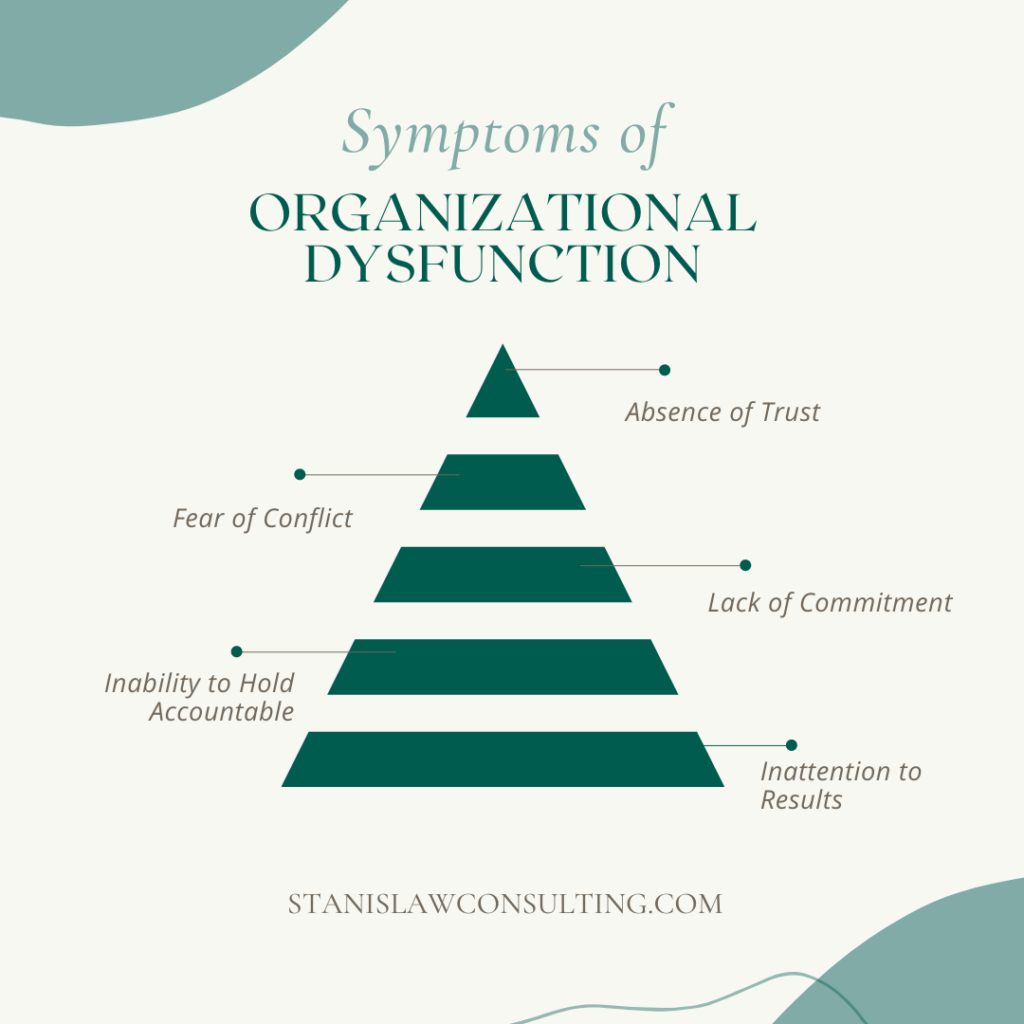Every team leader want your team to operate at peak effectiveness and productivity. Whether you own a small family business or manage a team within a larger organization, your success depends on your colleagues working well together. Dysfunction can push that productivity off the rails. Recognizing the symptoms of organizational dysfunction, and knowing how to address them is key to developing a workplace culture that values team results over individual accomplishments.
This is the first of a six-part blog series based on the book The Five Dysfunctions of a Team by Patrick Lencioni. Future blog posts will dive deeper into each of the 5 symptoms of organizational dysfunction described here and provide you with tools for treating the symptoms and moving your team toward added productivity.
Get Help with Leadership, Conflict Resolution, and Business Strategy
Talk to a consultant who can help you make strategic decisions about the future of your business.
Symptom #1: Absence of Trust is at the Heart of Organizational Dysfunction
Working together requires vulnerability. Team players need to be willing to expose their weaknesses and ask for help when they need it. When coworkers are unable to trust one another they may feel they are unable to take risks or express their opinion without being judged or shot down. This can lead to awkward silences in meetings, and an unwillingness to collaborate: signs of organizational dysfunction.

Symptom #2: Fear of Conflict Keeps Teams from Addressing Hard Problems
When teams don’t trust one another, it can grow into a fear of conflict. Coworkers may worry that expressing a contrary opinion will work against them. If team members aren’t making one another uncomfortable during discussions and raising hard questions, the outcome of those discussions will never be as robust as they could be. Conflict is not just acceptable; it is necessary to fully vet ideas and keep the team from experiencing roadblocks later during implementation.
Symptom #3: Lack of Commitment Makes Good Ideas Fall Flat
When conflict goes unresolved, team members may not be fully committed to the decisions made at those meetings. As a result, a dysfunctional organization lacking commitment will find dissenting members missing deadlines, benchmarks, and goals. They may also step back from further discussions and iterations on the ideas, demonstrating that they are not committed to the task at hand.
Symptom #4: Inability to Hold Each Other Accountable Fosters Organizational Dysfunction
Commitment gives team members the courage to hold one another accountable when their work falls short. The inability to confront colleagues for their shortcomings is a symptom of organizational dysfunction because it puts the all the corrective duties in the hands of the team leader. Top-down accountability is not enough. Without peer-to-peer pressure to uphold their commitments, team members may fall short of expectations, dragging the teams’ goals along with them.
Symptom #5: Inattention to Results Puts Individuals Over the Team
The final symptom of organizational dysfunction is a lack of attention toward team results. Without an effective team structure, workers will tend to focus on their own accomplishments and goals, rather than those of the team as a whole. This symptom expresses itself as selfishness, with members and leaders elevating their own egos and priorities rather than keeping focus on the team’s priorities.
Get Help Overcoming Organizational Dysfunction
If these symptoms of organizational dysfunction are manifesting within your team, there is still hope! Just like the symptoms of dysfunction build on each other, the strategies for building a good team will develop and show growing benefits over time. The best thing you can do is work with an organizational consultant who can help diagnosis your occupational dysfunction symptoms. Then together, you can develop a treatment plan to overcome those obstacles and get your team working together more effectively.
David Stanislaw is an organizational development specialist with over 25 years’ experience in resolving organizational dysfunction. Through business consulting and facilitation, David helps businesses and teams improve productivity and team cohesion. Contact us to meet with David to move toward high organizational functioning today.


Recent Comments